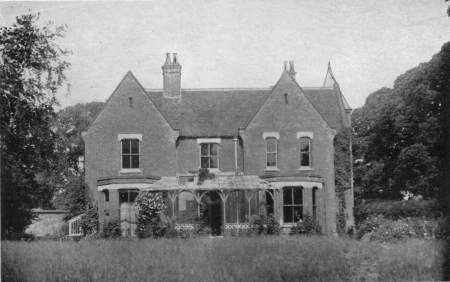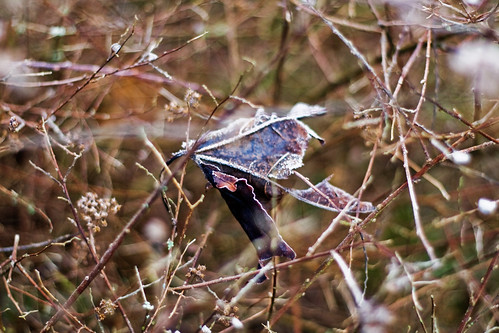Tweet
Dry lips moved without words inside dusty bandages. Empty eye sockets stared into the suffocating darkness of millennia. Voices echoed in the world beyond, voices strange and unfamiliar. Rotting ears strained to hear, and a lost mind struggled to understand. Ragged nails tore through ancient wrappings. Fingers more like talons scraped against thick painted wood. A panicked corpse thrashed against imprisonment.
The tourists moved away to another part of the museum, taking their cameras and guidebooks towards ancient Rome. A figure stepped forward from the shadow of Anubis. White hands pressed against the cold glass. Hungry eyes looked down at the sarcophagus, reading the story spelled out in hieroglyphs. Blackened lips curved in a smile to see the turmoil inside the case.
"Soon, my pretty, soon."
The necromancer turned away.
Friday, 27 January 2012
Tuesday, 24 January 2012
Creepy Houses
Tweet
If you follow me on Twitter or Facebook, you might have seen me talking about a dream which actually unsettled me. I rarely remember my dreams, and when I do, they've often just been weird as opposed to actually creepy or even scary - in fact, I don't even remember ever having had a nightmare. However in this case, not only did I remember my dream, I also dreamed about the same thing twice. In this case, that 'thing' was a house.
Naturally the details of dreams fade, but I remember it was a large house set in some kind of parkland, with a cemetery nearby. In the first dream, I simply visited it, and can only remember the large square entrance hall with the marble floor and balustrade running around the upper gallery. In the second dream, it transpired that my parents had bought it - for some reason their room was downstairs at the back of the house, and constantly in shadow due to the trees outside. My brother and I had rooms on the upper floor, but at opposite ends of the house. Mine was reached via an absolute maze of corridors that all looked alike, and I hated the fact that we were so spread out throughout the house. I got the distinct impression that the house enjoyed the isolation.
There was nothing really wrong with the house, apart from its peculiar decor, a mixture of wood-panelling and 1970s kitsch, but the whole time I was there, I felt continually as though I was being watched, and a general air of discomfort hung over the place. For the nights following, I found myself unwilling to go to sleep for fear of returning to a house that, as far as I know, was created by my imagination.
So what is it about houses? It's hardly surprising I'd be dreaming about them, considering the focus of my PhD upon haunted spaces in cinema, and my fascination with the Gothic as a literary device. Houses are supposed to provide warmth and shelter, not harbour threats or danger. Yet houses reflect the living - they're transformed into homes by the activity of their inhabitants, inanimate shells gaining animation by proxy. How often do we return from periods away from the home to find they have become cold and almost unfamiliar? We don't feel comfortable in our own home until our presence has returned the semblance of warmth and life.
It is the privileged position of the house as primary provider of shelter, the place in which we are at our most vulnerable during sleep, which grants the abandoned house, or simply a house which has stood empty for some time, that special air of creepiness. An abandoned house no longer fulfils its function of providing shelter - with no inhabitants, it ceases to exist according to its purpose, and becomes instead an arrangement of bricks and mortar.
Consider, too, the vast array of literary and cinematic examples of the haunted house. Yes, we have examples of ghosts haunting spaces other than that of the house (I'm thinking here of Ghost and its subway spectre, or the cab driving phantom of Ghostbusters) but the ghost's primary location is that of a domestic space. Naturally we are therefore conditioned to view old or rundown houses as being potentially haunted, and it is entirely possible that we project our own beliefs into the space, generating the signs and signifiers of a haunting ourselves. In many cases, abandoned houses are met with the words "Oh it's so sad", as though we feel a sense of sympathy for the house itself. Imbued with life by its inhabitants, a residue remains following their departure.
I can only assume that a combination of these factors, along with my own interest in the paranormal, the history of the Gothic and my experience with 'haunted' houses, has conspired to create an imaginary space in which to explore these feelings of dread and discomfort. I'm choosing that reading of the dream - I don't even want to consider it as some kind of metaphor...
 |
| Abandoned Mansion, Ostrowo, Poland Photo by Michał Żebrowski |
Naturally the details of dreams fade, but I remember it was a large house set in some kind of parkland, with a cemetery nearby. In the first dream, I simply visited it, and can only remember the large square entrance hall with the marble floor and balustrade running around the upper gallery. In the second dream, it transpired that my parents had bought it - for some reason their room was downstairs at the back of the house, and constantly in shadow due to the trees outside. My brother and I had rooms on the upper floor, but at opposite ends of the house. Mine was reached via an absolute maze of corridors that all looked alike, and I hated the fact that we were so spread out throughout the house. I got the distinct impression that the house enjoyed the isolation.
There was nothing really wrong with the house, apart from its peculiar decor, a mixture of wood-panelling and 1970s kitsch, but the whole time I was there, I felt continually as though I was being watched, and a general air of discomfort hung over the place. For the nights following, I found myself unwilling to go to sleep for fear of returning to a house that, as far as I know, was created by my imagination.
 |
| Borley Rectory, said to be one of the most haunted houses in England - now demolished |
It is the privileged position of the house as primary provider of shelter, the place in which we are at our most vulnerable during sleep, which grants the abandoned house, or simply a house which has stood empty for some time, that special air of creepiness. An abandoned house no longer fulfils its function of providing shelter - with no inhabitants, it ceases to exist according to its purpose, and becomes instead an arrangement of bricks and mortar.
Consider, too, the vast array of literary and cinematic examples of the haunted house. Yes, we have examples of ghosts haunting spaces other than that of the house (I'm thinking here of Ghost and its subway spectre, or the cab driving phantom of Ghostbusters) but the ghost's primary location is that of a domestic space. Naturally we are therefore conditioned to view old or rundown houses as being potentially haunted, and it is entirely possible that we project our own beliefs into the space, generating the signs and signifiers of a haunting ourselves. In many cases, abandoned houses are met with the words "Oh it's so sad", as though we feel a sense of sympathy for the house itself. Imbued with life by its inhabitants, a residue remains following their departure.
I can only assume that a combination of these factors, along with my own interest in the paranormal, the history of the Gothic and my experience with 'haunted' houses, has conspired to create an imaginary space in which to explore these feelings of dread and discomfort. I'm choosing that reading of the dream - I don't even want to consider it as some kind of metaphor...
Labels:
dreams,
ghosts,
haunted house
Monday, 23 January 2012
Photo Prompt 69
Tweet
New prompt available!
If you want to use the prompt, all I ask is that you include a link to this entry and a credit to me for the photograph, and that you post a link to your story in the comments box below so I can see what you've come up with! If you don't comment on this entry, then I can't comment on your story.
The 69th prompt is Dead Leaves.

All photo prompts are my own photography - you can find more of it on Flickr. You can also buy my prints from Deviantart. 20% of all proceeds go to charity - the other 80% go towards my PhD fees!
If you want to use the prompt, all I ask is that you include a link to this entry and a credit to me for the photograph, and that you post a link to your story in the comments box below so I can see what you've come up with! If you don't comment on this entry, then I can't comment on your story.
The 69th prompt is Dead Leaves.

All photo prompts are my own photography - you can find more of it on Flickr. You can also buy my prints from Deviantart. 20% of all proceeds go to charity - the other 80% go towards my PhD fees!
Labels:
photo prompt,
prompt,
writing prompts
Sunday, 22 January 2012
iBook Author app - good or bad?
Tweet
I read this article in the Metro newspaper last week, and found it online. For those of you who hadn't heard, a new iPhone app has been released that allegedly makes it even easier to publish books yourself. The iBook Author app lets you drag a word file into the app, and it does all the hard work by fixing the format and layout. Apparently users (note users, not writers) can fiddle with the layout and add photos and videos to their books. Oh dear me. While on one hand I applaud the recognition given to the e-publishing phenomenon, on the other hand I cannot help but groan that the writing process has been devalued to the extent that it's now simply the input portion of an app, in much the same way that anyone with the Instagram app now thinks they're a photographer.
Writing is not simply a case of chucking something together in Word, dropping it into an app and then making it available for sale through iTunes. Putting together a book should be a process that involves writing a draft, getting feedback from beta readers, and preferably having an experienced editor look it over. Hell, teach yourself the basics of HTML so you can code the thing yourself! I'm all for self-publishing, and I'm not saying that self published writers can't put out books - I've read some very, very professional self-published books that give the traditional publishers a run for their money - but I am saying that they need to look at the wider picture. Don't make the mistake of thinking that typing The End means your book is finished, and ready for public consumption.
The thing that bothers is me is that some people choose the self-publishing route for the better royalties and the greater degree of control over their work, and they're the writers who put in the effort, learn how to market and generally do quite well. They've weighed up the pros and cons of self-publishing, read up on it, and are determined to produce something that's just as good as, if not better than, something a traditional publisher might put out. Other people choose the route because their work as been consistently knocked back by agents and publishers alike, and instead of stepping back to look at what's wrong with the work itself, they just decide to put it out themselves. If that's you, then for God's sake get some feedback on why no one will take a punt on your project, and really work on it until it shines before you put it out there (unless you're one of those unfortunate writers whose work simply isn't classifiable, in which case you have your work cut out for you when it comes to marketing).
If you're hell bent on using this new technology, then how about this?
1 - Write the very best book that you can.
This should be a no-brainer, but don't just throw any old thing together and trust it will sell.
2 - Have trusted readers look it over.
I don't just mean your spouse or your mother. Have a set of beta readers whose opinion you trust, and who won't be afraid to tell you if something's not working. Other writers will provide invaluable feedback in terms of craft, while voracious readers will be able to give you their opinion in the context of what they read anyway.
3 - Get an editor to look at it.
You really do need an editor of some description, both in terms of typos, grammatical errors and other technical factors, but also in terms of flow, pacing and general storytelling. It's shocking how many e-books I've tried to read, only to find sentences peppered with bad grammar, repetitive words and typos.
4 - Spend some time playing around with covers.
If you're no good, ask the design department of your local college, enlist the help of a design-savvy friend, or invest in the services of a book cover designer if your budget stretches that far. People DO judge a book by its cover and just throwing something together in Photoshop will look terrible.
5 - Now use the app!
You will have a polished book that will be a credit to you, and will help boost the reputation of self-published books.
Writing is not simply a case of chucking something together in Word, dropping it into an app and then making it available for sale through iTunes. Putting together a book should be a process that involves writing a draft, getting feedback from beta readers, and preferably having an experienced editor look it over. Hell, teach yourself the basics of HTML so you can code the thing yourself! I'm all for self-publishing, and I'm not saying that self published writers can't put out books - I've read some very, very professional self-published books that give the traditional publishers a run for their money - but I am saying that they need to look at the wider picture. Don't make the mistake of thinking that typing The End means your book is finished, and ready for public consumption.
The thing that bothers is me is that some people choose the self-publishing route for the better royalties and the greater degree of control over their work, and they're the writers who put in the effort, learn how to market and generally do quite well. They've weighed up the pros and cons of self-publishing, read up on it, and are determined to produce something that's just as good as, if not better than, something a traditional publisher might put out. Other people choose the route because their work as been consistently knocked back by agents and publishers alike, and instead of stepping back to look at what's wrong with the work itself, they just decide to put it out themselves. If that's you, then for God's sake get some feedback on why no one will take a punt on your project, and really work on it until it shines before you put it out there (unless you're one of those unfortunate writers whose work simply isn't classifiable, in which case you have your work cut out for you when it comes to marketing).
If you're hell bent on using this new technology, then how about this?
1 - Write the very best book that you can.
This should be a no-brainer, but don't just throw any old thing together and trust it will sell.
2 - Have trusted readers look it over.
I don't just mean your spouse or your mother. Have a set of beta readers whose opinion you trust, and who won't be afraid to tell you if something's not working. Other writers will provide invaluable feedback in terms of craft, while voracious readers will be able to give you their opinion in the context of what they read anyway.
3 - Get an editor to look at it.
You really do need an editor of some description, both in terms of typos, grammatical errors and other technical factors, but also in terms of flow, pacing and general storytelling. It's shocking how many e-books I've tried to read, only to find sentences peppered with bad grammar, repetitive words and typos.
4 - Spend some time playing around with covers.
If you're no good, ask the design department of your local college, enlist the help of a design-savvy friend, or invest in the services of a book cover designer if your budget stretches that far. People DO judge a book by its cover and just throwing something together in Photoshop will look terrible.
5 - Now use the app!
You will have a polished book that will be a credit to you, and will help boost the reputation of self-published books.
Labels:
becoming a writer,
publication,
self publishing









